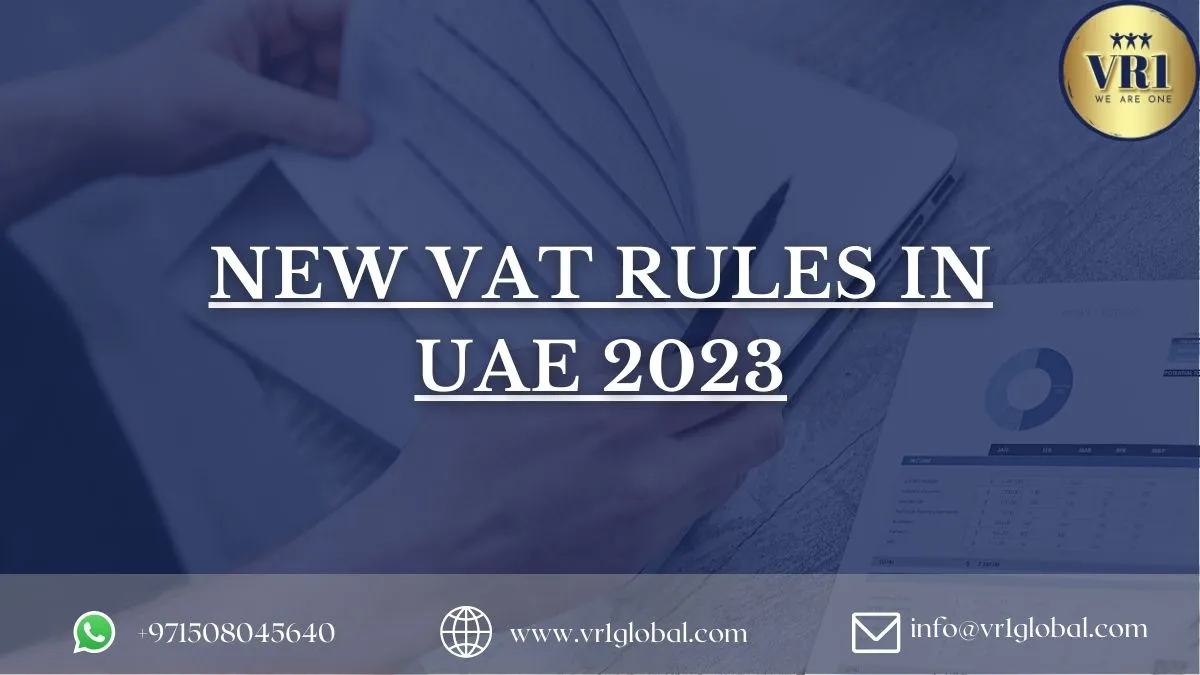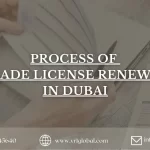New VAT Rules UAE 2024
According to the UAE Ministry of Finance, there have been 24 changes to specific provisions of the UAE Value-Added Tax (VAT) regime, which were introduced through Federal Decree-Law No. 18 of 2022, which will take effect from January 1, 2023. In this article, we will discuss the new VAT Rules UAE regime and how they may affect your business.
Introduction to VAT
VAT is a transaction-based indirect tax levied at each stage of the supply chain, and it is based on general consumption. The tax is levied at the point of sale, and businesses are required to register for VAT if their annual turnover exceeds AED 375,000.
The standard VAT rate in the UAE is 5%, and there are reduced rates of 0% and exemptions for certain goods and services.
Changes to the VAT Law
The UAE VAT 2023 regime introduces several changes to the existing VAT law, effective from January 1, 2023. Here are some of the key changes that you should note:
1. New Definitions
The new Decree-Law introduces new definitions for Relevant Charitable Activity, Pure Hydrocarbons, Tax Evasion, Tax Audit, Tax Assessment, and Voluntary Disclosure.
- The new definition of Relevant Charitable Activity clarifies what types of charitable activities are eligible for VAT exemption.
- Pure Hydrocarbons are now defined as those that are not subject to any chemical or physical treatment, which is relevant for calculating VAT on petroleum products.
- The definition of Tax Evasion has been expanded to include cases where the taxpayer provides incorrect information or omits information that leads to an underpayment of VAT. This definition will help authorities crack down on tax fraud.
- The definitions of Tax Audit and Tax Assessment have been updated to provide more clarity on the procedures for conducting audits and assessments, respectively.
- The new definition of Voluntary Disclosure provides guidance on how taxpayers can come forward to correct errors in their VAT returns without being penalized.
Voluntary Disclosure
Businesses will be able to make voluntary disclosures to correct their tax returns and pay any outstanding tax due without facing penalties or fines.
Here are some key importance of the Voluntary Disclosure in the UAE VAT 2023:
1. Avoid Penalties: One of the key importance of the Voluntary Disclosure in the UAE VAT 2023 is that it allows businesses to avoid penalties for errors or omissions in their VAT returns. The UAE Federal Tax Authority (FTA) may impose penalties ranging from AED 1,000 to AED 50,000 for non-compliance with VAT regulations.
2. Rectify Errors: Voluntary Disclosure allows businesses to correct any errors or omissions in their VAT returns that they may have made inadvertently. By rectifying these errors voluntarily, businesses can avoid the risk of penalties and other enforcement actions.
3. Preserve Reputation: Another key importance of the Voluntary Disclosure in the UAE VAT 2023 is that it helps businesses preserve their reputation by demonstrating their commitment to compliance with tax regulations. Voluntarily disclosing errors or omissions can also help to build trust with the FTA and other stakeholders.
4. Simplify Compliance: Voluntary Disclosure can also simplify compliance by allowing businesses to correct errors or omissions before they are identified by the FTA during an audit or other enforcement action. This can save businesses time and resources by avoiding the need to engage in lengthy and costly dispute-resolution processes.
Tax Audits
The tax authorities will have the right to conduct tax audits on businesses to ensure compliance with VAT regulations. The tax authorities may also request information from third parties to verify the accuracy of tax returns filed by businesses.
The new article specifies the time limit for the FTA to initiate tax audits, which is five years from the end of the tax period. This means that businesses will have certainty on the time limit for FTA to conduct tax audits, which can help them plan and prepare better for the audits.
Tax Evasion
The significance of this amendment is that it aims to prevent fraudulent activities in VAT reporting and ensure compliance with VAT regulations by businesses and individuals.
The new definition and penalties for tax evasion emphasize the importance of transparency and honesty in VAT reporting and payment, which is expected to promote trust and confidence in the UAE’s tax system.
According to the Federal Tax Authority (FTA) of the United Arab Emirates (UAE), the maximum administrative fine for tax evasion will be reduced to 200% of the tax amount instead of 300%.
New Exemptions
As for the exemptions under UAE VAT 2023, businesses will still be able to claim VAT exemptions for healthcare, education, and social services, among other things, as long as they meet the requirements specified in the VAT Law and Executive Regulations.
2. Supply of Goods
According to the Federal Decree-Law No. 8 of 2017 on Value Added Tax (VAT) and its amendments as per Federal Decree-Law No. 18 of 2022, Article 5 defines the supply of goods in two ways:
- The first is the transfer of ownership of goods or the right to use them to another person according to what is specified in the Executive Regulation of this Decree-Law.
- The second is the entry into a contract between two or more parties entailing the transfer of goods at a later time, pursuant to the conditions specified in the Executive Regulation of this Decree-Law.
In terms of importance, these changes aim to clarify the rules and regulations governing the transfer of ownership and contract agreements, which would benefit both buyers and sellers in the UAE.
This change could also reduce the potential for disputes and misunderstandings that could arise from ambiguous terms in agreements.
3. Supply in Special Cases
According to the amendments, Supply in Special cases refers to situations where the ownership of goods is transferred in the UAE, but the goods are physically kept outside the country. In such cases, VAT is still applicable to payments made.
4. Registration Exceptions
According to Article 15 of the UAE VAT Law, if all of a business’s supplies are zero-rated or if it no longer makes any other supplies besides zero-rated supplies, it may be eligible for an exception from VAT registration. However, businesses must apply for this exemption, and it is not automatically granted.
5. Tax Deregistration
According to this amendment, Federal Tax Authority (FTA) has the power to deregister registered persons forcibly, when necessary, under Article 21 of the VAT Law.
6. Date of Supply in Special Cases
In special cases where a contract involves periodic payments or consecutive invoices, the date of supply for goods or services shall be the earliest of any of the following dates, provided that it does not exceed one year from the date of provision of such goods or services:
(a) the date of issuance of any tax invoice,
(b) the date payment is due as shown on the tax invoice, or
(c) the date of receipt of payment.
If the supply involves assembly or installation, the date of supply is the date when the goods are assembled or installed.
For services, the basic tax date for the supply is the date on which the services are performed or completed.
In general, the tax will be levied on the earliest of the following dates: the date of issuance of a tax invoice, the date payment is due as shown on the tax invoice, or the date of receipt of payment.
Determining the time of supply might get confusing in some cases, particularly when it involves cross-border supply. Still, the date of supply can be determined based on the date of an invoice or if the stock has been on the premises for more than 12 months.
7. Place of Supply
When goods are imported into the UAE from a place outside the UAE, the place of supply will be considered the UAE, and UAE VAT will be applicable to the supply.
Ministerial Decision No. 26 of 2023 was issued on February 22, 2023, to establish criteria and conditions for a supply of goods and services to be considered as an electronic commerce supply via an Electronic Commerce Medium.
8. The agent
According to this amendment, the place of residence of the principal will be deemed to be the place of residence of the agent under certain conditions.
Prior to this amendment, the terms “principal” and “agent” appeared to be used interchangeably in the VAT Decree Law. However, this amendment clarifies the distinction between the two terms.
Please note that the place of residence of the agent will still be deemed to be the place of residence of the principal under the current VAT law if the principal is a non-resident or if the agent is acting on behalf of the principal but is not registered for VAT. This amendment aims to provide clarity and reduce confusion in the VAT system.
9. Supply Exempt from Tax
The supply of residential buildings is exempt from VAT subject to certain conditions, such as the lease being more than six months or the tenant of the property holding an ID card issued by the Emirates Identity Authority.
In addition, certain financial services, the supply of bare land, and local passenger transport are also exempt from VAT in the UAE.
10. Recovery of Recoverable Input Tax in the Tax Period
Catherine Workman Partner, Head of Middle East, stated that “intention to pay” is not viewed as existing until the purchaser has processed the invoice through all normal invoice processing procedures, including approving the invoice for payment. This clarification was welcomed by many in the industry.”
11. Instances and Conditions for Output Tax Adjustments
According to Article 61 of the amended VAT law in the UAE, a registrant may adjust output tax after the date of supply in any of the following instances as mentioned in GCC Fintax: if the supply was canceled, if the tax treatment of the supply has changed due to a change in the nature of the supply, and if the consideration for the supply has been changed.
12. Output Tax Adjustments Mechanism
As per Article 62 of the UAE VAT Law, a taxpayer must issue a Tax Credit Note within 14 days of issuing the tax invoice to adjust the output tax.
This means that if the taxable person discovers an error in the tax invoice or if the customer returns the goods or services, the taxable person can adjust the output tax by issuing a Tax Credit Note.
A Tax Credit Note is a document that shows the amount of tax credited to the customer or the amount of tax that the taxable person has to refund.
This document must contain certain details such as the date of issue, name, and address of the taxable person and the customer, the amount of tax credit, and the reason for issuing the Tax Credit Note.
13. Reverse Charge
The amended VAT Law restricts RCM to only Pure Hydrocarbons. RCM is a specific tax treatment of VAT in the UAE which applies to businesses that purchase goods from suppliers based outside the UAE.
In this mechanism, the recipient of the goods collects the tax from the end customer and pays it later to the government authority.
14. Statute of Limitation (New Article bis)
This New Article “Statute of limitation” is intended to clarify the time limit for the FTA to initiate tax assessments, conduct audits, and issue tax assessments.
FAQs on VAT Rules UAE
1. Who is exempted from VAT in UAE?
A. Certain categories of goods and services, such as healthcare and education, are exempt from VAT in the UAE. Additionally, businesses with annual revenues below a certain threshold may also be exempt.
2. How can I avoid VAT in Dubai?
A. There is no legal way to completely avoid VAT in Dubai. However, certain businesses may be eligible for VAT refunds under certain conditions.
3. Who is eligible for VAT in UAE?
A. Businesses that exceed the annual revenue threshold (currently AED 375,000) are required to register for VAT in the UAE.
4. Can VAT be claimed back in UAE?
A. VAT can be claimed back by businesses in the UAE if they meet certain requirements and conditions, such as being registered for VAT and having valid invoices and receipts.
5. How is VAT calculated monthly?
A. VAT is calculated monthly based on the value of taxable supplies and the applicable VAT rate (currently 5% in the UAE).
6. Will Freezones have to pay VAT in Dubai?
Not all free zones in Dubai are required to pay VAT. Only the 20 Designated Zones in the UAE are currently exempt from VAT, while other free zones in Dubai may be subject to VAT if they have a taxable supply exceeding AED 375,000.
Final Words on New VAT Rules in UAE
As we draw closer to the implementation of the new VAT rules in the UAE in 2023, it is imperative that businesses take proactive steps to ensure compliance.
At VR1 Global Business Consultancy, we are committed to helping businesses navigate the intricate landscape of tax registration and company formation in Dubai. We pride ourselves on providing bespoke services that are tailored to the unique needs of each client.
Whether you require assistance with tax registration, company formation, or any other aspect of business consulting, we are here to help. We understand that compliance can be a daunting task, but with our guidance and support, you can rest assured that your business is in safe hands.
So if you’re looking for a reliable and trustworthy partner to help you navigate the complexities of the UAE’s Business landscape then contact us today via WhatsApp or email, and let us help you take your business to new heights!




